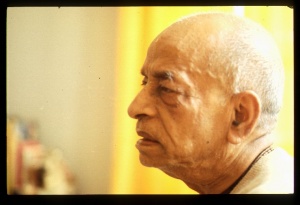CC Antya 16.132: Difference between revisions
m (1 revision(s)) |
No edit summary |
||
| Line 1: | Line 1: | ||
{{ | [[Category:Sri Caitanya-caritamrta - Antya-lila Chapter 16|C132]] | ||
<div style="float:left">'''[[Sri Caitanya-caritamrta|Śrī Caitanya-caritāmṛta]] - [[CC Antya|Antya-līlā]] - [[CC Antya 16|Chapter 16: Lord Śrī Caitanya Mahāprabhu Tastes Nectar from the Lips of Lord Śrī Kṛṣṇa]]'''</div> | |||
<div style="float:right">[[File:Go-previous.png|link=CC Antya 16.131|Antya-līlā 16.131]] '''[[CC Antya 16.131|Antya-līlā 16.131]] - [[CC Antya 16.133|Antya-līlā 16.133]]''' [[File:Go-next.png|link=CC Antya 16.133|Antya-līlā 16.133]]</div> | |||
{{CompareVersions|CC|Antya 16.132|CC 1975|CC 1996}} | |||
{{RandomImage}} | |||
==== TEXT 132 ==== | ==== TEXT 132 ==== | ||
<div | <div class="verse"> | ||
kṛṣṇa ye khāya tāmbūla, kahe tāra nāhi mūla, | :kṛṣṇa ye khāya tāmbūla, kahe tāra nāhi mūla, | ||
tāhe āra dambha-paripāṭī | :tāhe āra dambha-paripāṭī | ||
tāra yebā udgāra, tāre kaya | :tāra yebā udgāra, tāre kaya 'amṛta-sāra', | ||
gopīra mukha kare | :gopīra mukha kare 'ālabāṭī' | ||
</div> | </div> | ||
| Line 14: | Line 18: | ||
==== SYNONYMS ==== | ==== SYNONYMS ==== | ||
<div | <div class="synonyms"> | ||
''kṛṣṇa''—Lord Kṛṣṇa; ''ye''—what; ''khāya''—chews; ''tāmbūla''—the betel; ''kahe''—it is said; ''tāra''—of it; ''nāhi''—there is not; ''mūla''—price; ''tāhe''—over and above that; ''āra''—also; ''dambha-paripāṭī''—complete pride; ''tāra''—of that; ''yebā''—whatever; ''udgāra''—coming out; ''tāre''—that; ''kaya''—is called; ''amṛta-sāra''—the essence of the nectar; ''gopīra''—of the ''gopīs''; ''mukha''—the mouth; ''kare''—makes; ''ālabāṭī''—spittoon. | |||
</div> | </div> | ||
| Line 21: | Line 25: | ||
==== TRANSLATION ==== | ==== TRANSLATION ==== | ||
<div | <div class="translation"> | ||
"The betel chewed by Kṛṣṇa is priceless, and the remnants of such chewed betel from His mouth are said to be the essence of nectar. When the gopīs accept these remnants, their mouths become His spittoons. | |||
</div> | </div> | ||
__NOTOC__ | |||
<div style="float:right; clear:both;">[[File:Go-previous.png|link=CC Antya 16.131|Antya-līlā 16.131]] '''[[CC Antya 16.131|Antya-līlā 16.131]] - [[CC Antya 16.133|Antya-līlā 16.133]]''' [[File:Go-next.png|link=CC Antya 16.133|Antya-līlā 16.133]]</div> | |||
__NOTOC__ | |||
__NOEDITSECTION__ | |||
Revision as of 09:48, 24 September 2021
Śrī Caitanya-caritāmṛta - Antya-līlā - Chapter 16: Lord Śrī Caitanya Mahāprabhu Tastes Nectar from the Lips of Lord Śrī Kṛṣṇa

His Divine Grace
A.C. Bhaktivedanta Swami Prabhupada
A.C. Bhaktivedanta Swami Prabhupada
TEXT 132
- kṛṣṇa ye khāya tāmbūla, kahe tāra nāhi mūla,
- tāhe āra dambha-paripāṭī
- tāra yebā udgāra, tāre kaya 'amṛta-sāra',
- gopīra mukha kare 'ālabāṭī'
SYNONYMS
kṛṣṇa—Lord Kṛṣṇa; ye—what; khāya—chews; tāmbūla—the betel; kahe—it is said; tāra—of it; nāhi—there is not; mūla—price; tāhe—over and above that; āra—also; dambha-paripāṭī—complete pride; tāra—of that; yebā—whatever; udgāra—coming out; tāre—that; kaya—is called; amṛta-sāra—the essence of the nectar; gopīra—of the gopīs; mukha—the mouth; kare—makes; ālabāṭī—spittoon.
TRANSLATION
"The betel chewed by Kṛṣṇa is priceless, and the remnants of such chewed betel from His mouth are said to be the essence of nectar. When the gopīs accept these remnants, their mouths become His spittoons.